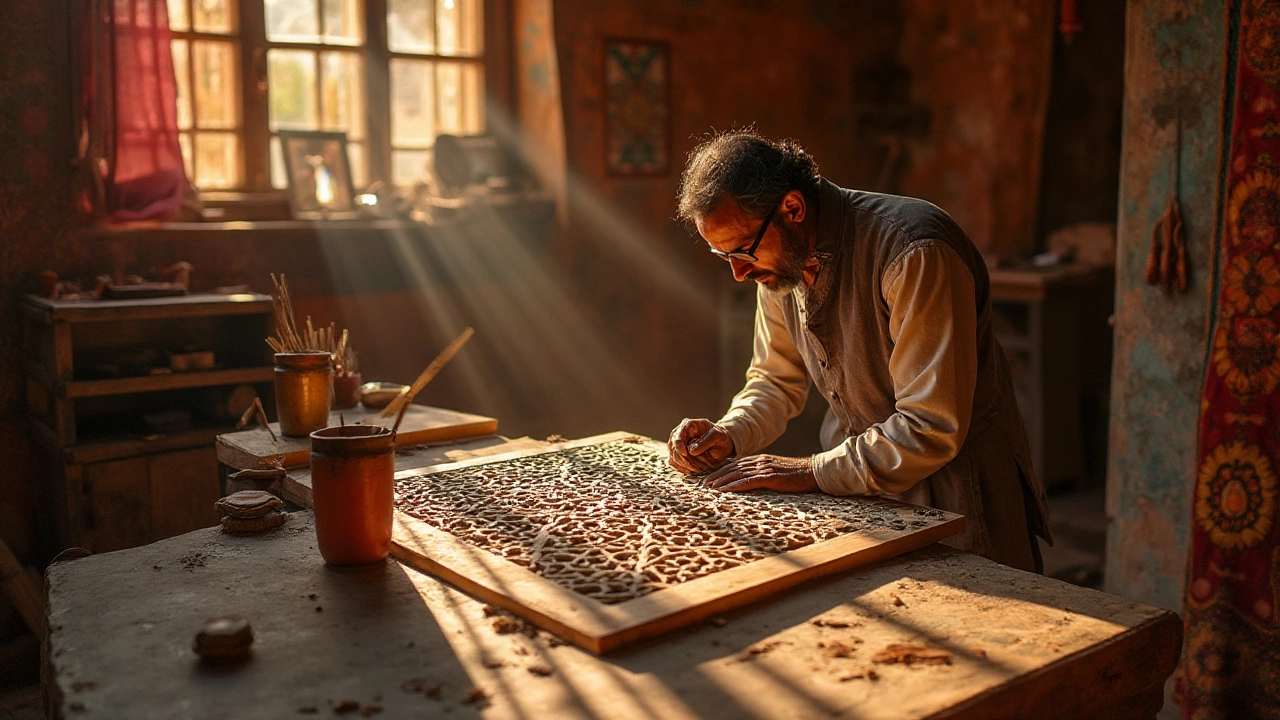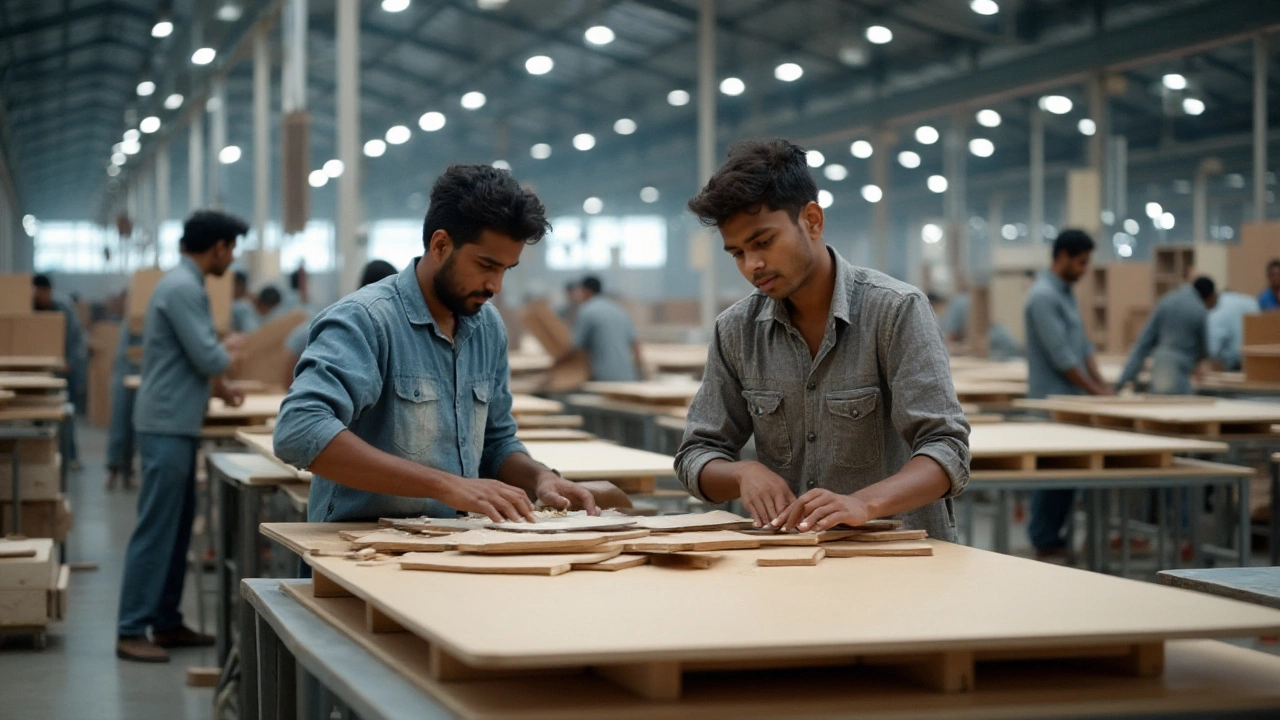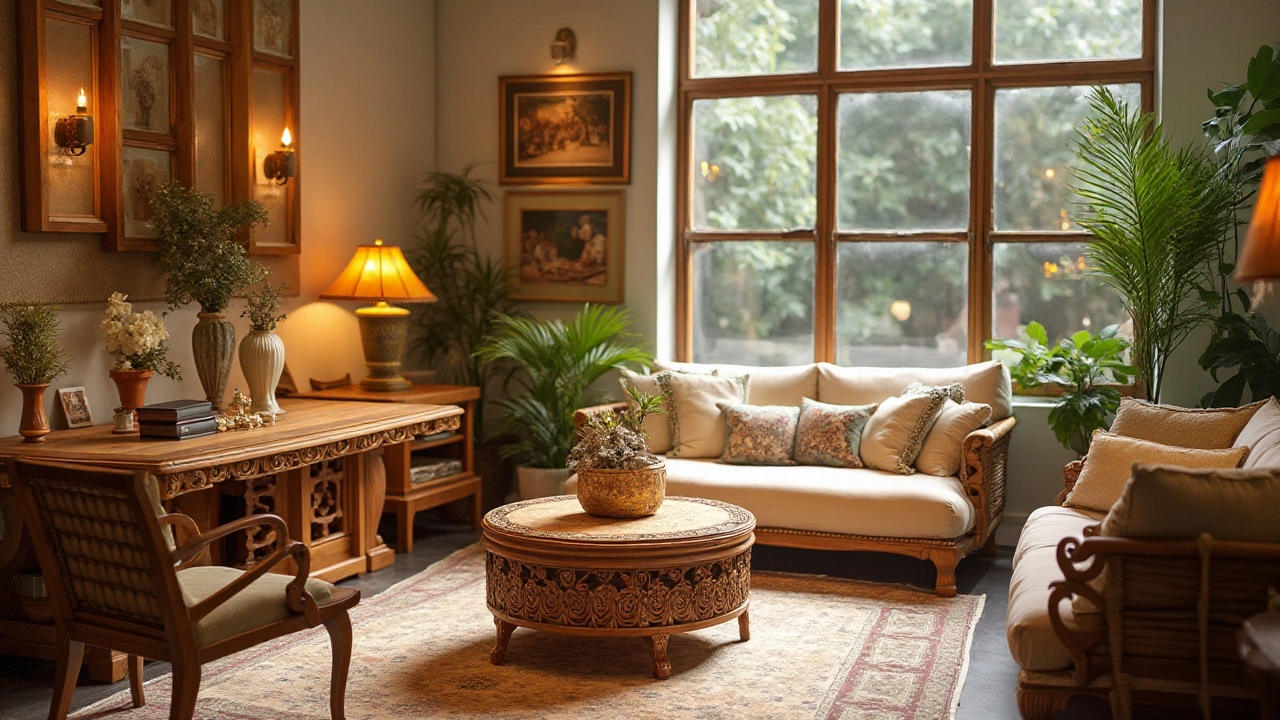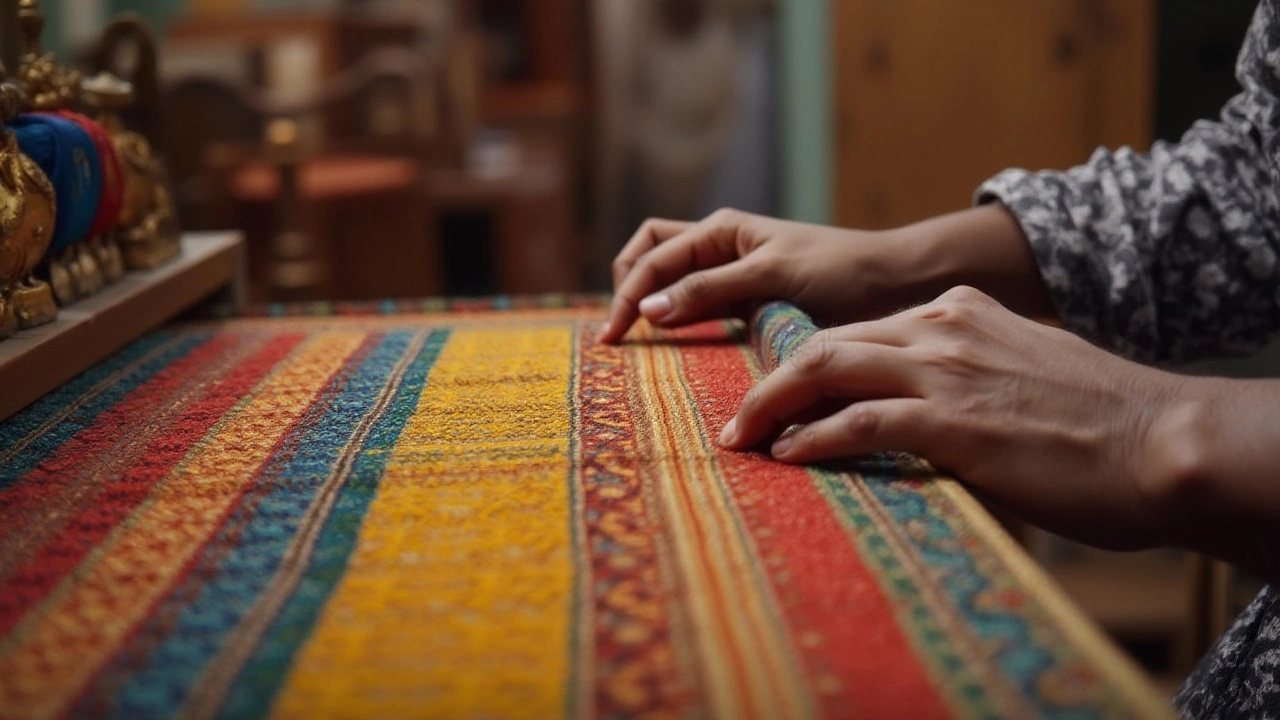 Jan, 17 2025
Jan, 17 2025
India's vibrant culture and rich history echo through its furniture, offering an unrivaled blend of artistry and utility. For centuries, skilled artisans across the subcontinent have honed their craft, creating furniture that is both functional and aesthetically pleasing. Today, Indian furniture manufacturers are recognized not only for their beautiful designs but also for their commitment to quality and sustainability.
At the heart of this industry are manufacturers who meticulously combine traditional techniques with contemporary innovation, resulting in unique pieces that capture the global market's attention. Whether it's the intricate woodwork from Rajasthan or the sleek, modern designs coming out of Bengaluru, each piece tells a story—of both its maker and its place of origin.
Sustainability plays a crucial role in shaping today's furniture landscape, and Indian manufacturers are at the forefront, using eco-friendly practices and materials. As the world gravitates towards responsible consumption, these manufacturers continually push boundaries, ensuring their creations align with a greener future.
- A Legacy of Craftsmanship in India
- Renowned Indian Furniture Manufacturers
- The Unique Appeal of Handmade Designs
- Sustainable and Innovative Practices
A Legacy of Craftsmanship in India
The story of Indian furniture is as old as the civilization itself, a legacy that intertwines artistry with the everyday lives of its people. It all begins with the Indus Valley Civilization, an era that laid the groundwork for woodcraft traditions that persist even today. Over the millennia, as various dynasties rose and fell, a plethora of styles emerged across the diverse regions of India. Each area developed its own distinctive techniques and motifs, infused with local culture and materials available in the vicinity.
In Rajasthan, for instance, you find a dazzling display of intricately carved wooden furniture that speaks of the state's opulent past. The royal patrons of yesteryears had a penchant for grandeur, and this is evident in the stately chairs, tables, and cabinets adorned with elaborate designs. Similarly, the artisans of Kashmir have left their mark with exquisite walnut woodwork, known for its graceful forms and intricate inlays. Meanwhile, in Kerala, the use of solid rosewood and teak showcases a different approach, one that focuses on durability and elegant simplicity.
"India's furniture legacy is not just about utility; it's an expression of cultural identity and artistic excellence," said Lakshmi Venkatesh, an expert on traditional Indian crafts.
The passage of time has not diminished this rich heritage. Instead, it flourishes today as contemporary artisans blend traditional skills with modern tastes, creating handmade designs that rival any in the world. This fusion of the past and present is what makes Indian furniture incredibly alluring. The industry is booming, with manufacturers crafting a wide range of styles that cater to both domestic and international markets. Yet, despite embracing innovation, the essence of painstaking craftsmanship remains at the heart of each creation.
In a world impacted by mass production, the demand for bespoke and artisanal products grows steadily, and Indian furniture makers are well-poised to meet this need. Their commitment to quality echoes through their detailed handiwork, drawing individuals who value authenticity and craftsmanship. This commitment is recognized in global markets, where Indian pieces are not merely furniture; they are treasured artifacts that tell stories of time-honored traditions and the skilled hands that bring them to life. As the cycle of craftsmanship continues, the legacy lives on, driving both the culture and economy forward.

Renowned Indian Furniture Manufacturers
The world of Indian furniture manufacturing is as diverse as the country itself, brimming with tradition and modernity intertwined in every creation. When discussing some of the most renowned names in this field, a few furniture manufacturers stand out for their unique ability to capture both the essence of Indian artistry and the demands of contemporary design trends. Each of these manufacturers brings something distinctive to the table, crafting pieces that are not only visually striking but also built to stand the test of time. As the globalization of design continues to evolve, these companies have positioned themselves not just as suppliers, but as trendsetters on the international stage.
A notable player in this field is Godrej Interio, part of the larger Godrej Group, which has built a formidable reputation over decades. Known for their innovation and functionality, they have managed to blend traditional craftsmanship with modern needs, offering a wide variety of products that cater to homes and offices alike. They emphasize sustainable practices, incorporating eco-friendly materials into their process, making them a popular choice for environmentally conscious consumers.
'When it comes to sustainability, we prioritize it in all our designs, ensuring minimal impact on the environment,' says an industrial designer from Godrej Interio.The company's manufacturing units are spread across India, enabling them to efficiently deliver products that are affordable without compromising on quality.
Another celebrated name is FabIndia, which taps into the rich heritage of Indian artistry. They collaborate with thousands of artisans from across the country, bringing traditional craftsmanship to a global audience under their distinctive handmade designs brand. FabIndia specializes in wooden furniture, where no piece is quite the same, owing to the meticulous handiwork of local artisans. This approach not only preserves age-old techniques but also empowers rural craftspeople by providing them a wider market. Their rustic, earthy furniture pieces stand out for their authenticity, making any space feel warm and inviting.
Urban Ladder, a pioneer of the contemporary market, offers a different take. Established with a vision to bridge the gap between luxury and accessibility, they have become synonymous with sleek, modern designs that appeal to the urban lifestyle. While their focus is primarily on aesthetic appeal, they do not overlook ergonomics and quality. From minimalist bed frames to statement-making sofas, their range embodies the essence of modern living. The brand's success lies in its daring approach to reimagine traditional items with fresh perspectives, targeting a younger demographic seeking to express individuality through home decor.
One cannot overlook the contributions of Durian, a brand that underscores versatility in design. Known for their robust furniture that marries functionality with elegance, Durian has carved out a niche in both residential and commercial sectors. Their collections are a testament to the brand's understanding of diverse customer needs—from classic wood finishes to modular office systems. With an eye on future trends, they continually refresh their offerings to stay relevant in a dynamic market. Each of these manufacturers has uniquely contributed to positioning India as a burgeoning hub for top-tier furniture manufacturing on a global scale.

The Unique Appeal of Handmade Designs
In an era dominated by mass production, handmade designs stand as beacons of individuality and authenticity. Indian furniture manufacturers have long embraced the art of handmade production, weaving stories into every curve and grain. The process, deeply rooted in tradition, involves meticulous attention to detail, often passed down through generations of artisans. This dedication ensures that each piece is not just furniture but a unique embodiment of culture and history.
Furniture crafted by hand possesses a soul, infused with the passion and skill of its maker. Artisans from regions such as Rajasthan and Kerala channel centuries-old techniques, applying them to create pieces that boast a distinct charm. The intricate carvings, careful joinery, and selection of materials often reflect local influences and the natural environment. Such attention to detail is rarely replicated by machines, which tend to prioritize speed and uniformity over individuality and character.
Many of these handmade treasures benefit from the careful selection of premium woods like teak and rosewood, known for their durability and beauty. But it's the human touch that truly transforms these materials, making every curve tell a story, every joint a testament to craftsmanship.
"There's a profound sense of identity in every handmade piece," notes Anuj Prasad, a renowned design strategist. "They are not just products; they are an art form that evokes emotion and connection."This distinction is crucial in a global market where consumers increasingly seek authenticity and meaning in their purchases.
The rise in demand for unique, handmade designs has encouraged Indian manufacturers to explore sustainable resources and innovative techniques without compromising on aesthetics. This is particularly evident in collaborations with eco-conscious designers who prioritize reclaimed or ethically sourced materials. By doing so, these manufacturers not only preserve traditional craftsmanship but also contribute to a more sustainable future. Such practices resonate with a broader trend where consumers desire products that align with environmental and ethical values.
Moreover, the handmade process allows for customization, a feature that sets these manufacturers apart. Clients often have the opportunity to be part of the design process, choosing finishes or alterations that reflect their personal style. This level of customization ensures that each piece fits perfectly into its intended space, both physically and in terms of ambiance. The outcome is a one-of-a-kind creation, tailored to the specific tastes and requirements of the individual, a stark contrast to the cookie-cutter models prevalent in mass-market outlets.
By promoting their handmade designs, Indian furniture manufacturers have cemented their stance in the global marketplace, attracting both connoisseurs and everyday consumers. As more individuals recognize the value of this meticulous craftsmanship, the appreciation for handmade furniture continues to grow, celebrating not only the objects but the stories and heritage they carry. Through handmade designs, these artisans offer a slice of Indian culture that consumers worldwide can experience in their homes.

Sustainable and Innovative Practices
The surge in environmental consciousness has compelled the Indian furniture industry to rethink its strategies, integrating sustainable and innovative practices into the very fabric of its operations. No longer is it just about aesthetics and functionality; there's a growing emphasis on the materials used and the processes followed to produce these exquisite pieces. Many manufacturers are now turning towards reclaimed wood and bamboo as their primary materials, reducing the dependency on natural resources while also giving a second life to materials that would otherwise go to waste. As a result, they not only curtail their carbon footprint but also instill in their clientele a sense of responsibility and awareness about their choices.
Incorporating technology has also played a pivotal role in transforming this sector. State-of-the-art tools and machines now allow craftsmen to maintain precision while reducing material wastage. Digital platforms have made it easier to design and visualize furniture, enabling seamless collaboration between designers and artisans from different parts of the world, which enhances the quality and cost-efficiency of production. A key trend among Indian manufacturers is the use of smart features in furniture that blend seamlessly into modern lifestyles, like foldable workstations and modular storage solutions that maximize space without compromising style and elegance.
Another noteworthy shift in the industry is the push towards circular economy models. Manufacturers are not just creating furniture; they are building systems for recycling and refurbishing products at the end of their lifecycle. Through incentive programs, they encourage customers to return old furniture, which is then either recycled or refurbished to maintain its utility. According to a recent report, companies adopting these practices have seen a 25% rise in customer loyalty, as consumers are increasingly drawn to brands that reflect their values. These initiatives empower consumers to make choices that support sustainability, aligning with a global movement towards more resilient and eco-friendly business practices.
"Adopting eco-friendly practices isn't merely a trend; it's a necessity for the survival of businesses," says Anjali Sinha, CEO of a leading furniture brand. "Our commitment to sustainability reflects our belief in leaving a lasting impact that's positive, not just on the industry, but on the planet."
This dedication to both sustainability and innovation is not purely altruistic but also smart business. It allows Indian furniture manufacturers to differentiate themselves in a crowded market, positioning handmade designs that speak to a socially and environmentally conscious audience. They are indeed setting the stage for a global standard in furniture manufacturing, where care for the planet goes hand in hand with crafting timeless designs.